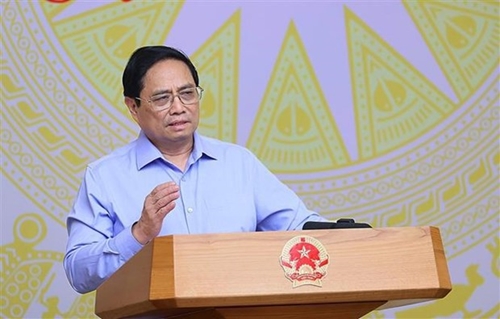At the event, connected with the 63 provincial-level localities via videoconferencing, Prime Minister Pham Minh Chinh, who is also Head of the committee, highly valued the efforts and achievements in this regard by the committee, ministries, sectors, and localities, but also requested stronger moves to better serve people and businesses.
He demanded pushing ahead with administrative reform, especially that of administrative procedures, enhancing the policy response capacity, reforming internal administrative procedures, and promoting administrative discipline and improving the quality of civil servants.
    |
 |
|
Prime Minister Pham Minh Chinh speaks at the hybrid event on July 19. |
The Government leader pointed out three priority areas, namely reviewing legal documents to detect bottlenecks; overhauling administrative procedures at all levels to facilitate production and business activities and create livelihoods for people; and examining personnel to commend those fulfilling duties and deal with poor-performing ones in line with the Party and State’s regulations.
Prime Minister Pham Minh Chinh asked members of the steering committee and leaders of ministries, sectors, and localities to view administrative reform as a focal task and a criterion for assessing officials, civil servants and public employees’ performance; promote agency leaders’ sense of responsibility towards administrative reform; accelerate the settlement of problems facing people and enterprises; speed up the re-organization of their subordinate agencies and units; increase inspection to boost discipline; and stringently handle wrongdoings.
He also assigned tasks to certain ministries and sectors, expressing his belief that administrative reform, especially that in tandem with digital transformation, will be promoted to help carry out political and socio-economic tasks for 2023 and beyond.
Since 2021, ministries and ministry-level agencies have cut or streamlined 2,352 business-related rules regulated in 191 legal documents. They have also implemented plans on the abolition or simplification of 470 others of this kind in 56 documents, according to the steering committee.
The Government Office reported that so far, 31.16% of the results of the settlement of administrative procedures have had electronic versions, and 66.48% of the administrative procedure dossiers digitalized.
Meanwhile, 62 of the 63 localities and 10 of the 21 ministries and sectors have merged their public service portals and electronic single-window information systems into ministry- and provincial-level information systems for handling administrative procedures which have also been connected with the National Public Service Portal.
Source: VNA